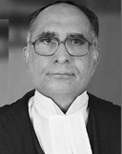
Meet Justice S.H. Kapadia and his Notable Judicial decisions
Justice Sarosh Homi Kapadia (1947–2016) served as the 38th Chief Justice of India from May 12, 2010, to September 28, 2012. Born in Mumbai to a modest Parsi family, Kapadia’s journey from working as a clerk and peon to the nation’s highest judicial office is widely celebrated as a story of perseverance and integrity. He graduated from Government Law College, Mumbai, and began his legal practice in the Bombay High Court, representing government bodies and specializing in tax and land law.
Judicial Career and Philosophy
Justice Kapadia’s career was marked by an unwavering commitment to judicial independence, work ethic, and ethical rigor. He was known for his austere lifestyle, deep interest in Eastern philosophy, and belief that a judge’s work was a “spiritual function”. Over his nine years on the Supreme Court, he authored 305 judgments and sat on 1,074 benches, with a focus on tax, constitutional, and administrative law.
Landmark Judgments
1. Vodafone International Holdings v. Union of India (2012)
Justice Kapadia led the bench that ruled in favor of Vodafone, holding that the Indian tax authorities could not tax offshore transactions between foreign companies merely because the underlying assets were located in India. The judgment clarified the limits of India’s tax jurisdiction and was hailed for its clarity and adherence to international legal principles.
2. Centre for Public Interest Litigation v. Union of India (2011) – CVC Appointment Case
In this case, Kapadia’s bench quashed the appointment of P.J. Thomas as Central Vigilance Commissioner, finding the government’s selection process illegal and ultra vires. The judgment reinforced the principle that government appointments, even at the highest levels, must adhere to legality and transparency.
3. Sahara India Real Estate Corp. Ltd. v. SEBI (2012)
Justice Kapadia addressed the conflict between media freedom and fair trial rights. He held that courts could temporarily restrict media reporting in cases where such reporting posed a real and substantial risk to the fairness of the trial, but left the decision to the discretion of judges on a case-by-case basis.
4. Landmark Tax and Land Law Rulings
Kapadia’s expertise in tax law led to several significant decisions that shaped India’s approach to direct and indirect taxation. He also delivered key judgments on land rights, emphasizing due process and protection against arbitrary state action.
Legacy
Justice S.H. Kapadia is remembered for his integrity, judicial discipline, and landmark rulings that strengthened the rule of law and government accountability. His judgments in tax, administrative, and constitutional law continue to influence Indian jurisprudence, and his personal journey remains an inspiration for generations of legal professionals












comments